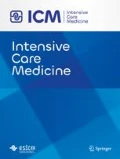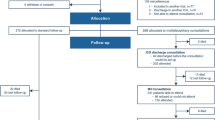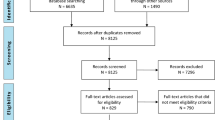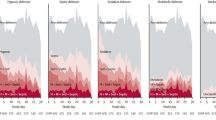Abstract
Neuropsychological assessment has been utilized extensively in the research of cognitive outcomes associated with medical illnesses, such as HIV, and post-surgical procedures, such as coronary artery bypass graft. However, few investigations of intensive care unit (ICU) survivors have examined cognitive function as a clinical outcome. Significant clinical questions exist regarding the impact of critical illness on long-term cognitive function. Many of these questions can be systematically evaluated through the use of standardized neuropsychological assessment instruments within the context of well designed, prospective research trials. This review will provide information for clinical researchers interested in the study of neuropsychological outcomes in intensive care unit survivors ( a comparison article in this issue will address clinical issues related to cognitive functioning).
Similar content being viewed by others
References
Angus DC, Carlet J (2003) Surviving intensive care: a report from the 2002 Brussels Roundtable. Intensive Care Med 29:368–377
Hopkins RO, Weaver LK, Pope D, Orme JF, Bigler ED, Larson-Lohr V (1999) Neuropsychological sequelae and impaired health status in survivors of severe acute respiratory distress syndrome. Am J Respir Crit Care Med 160:50–56
Jackson JC, Hart RP, Gordon SM, Shintani A, Truman B, May L, Ely EW (2003) Six-month neuropsychological outcome of medical intensive care unit patients. Crit Care Med 31:1226–1234
Rothenhausler HB, Ehrentraut S, Stoll C, Schelling G, Kapfhammer HP (2001) The relationship between cognitive performance and employment and health status in long-term survivors of the acute respiratory distress syndrome: results of an exploratory study. Gen Hosp Psychiatry 23:90–96
Al-Saidi F, McAndrews MP, Cheung AM, Tansey CM, Matte-Martyn A, Diaz-Granados N, Herridge M (2003) Neuropsychological sequelae in ARDS survivors (abstract). Am J Respir Crit Care Med 167:A737
Marquis KA, Curtis JR, Caldwell ES, Davidson TA, Davis JM, Sanchez P, Rosenbaum G, Hudosn LD, Steinberg KP (2000) Neuropsychological sequelae in survivors of ARDS compared with critically ill control patients (abstract). Am J Respir Crit Care Med 161:A383
Hopkins RO, Collingridge D, Weaver LK, Chan K, Orme JF (2003) Neuropsychological sequelae following acute respiratory distress syndrome: two year outcome. J Int Neuropsychol Soc 9:584
Symes E, Maruff P, Ajani A, Currie J (2000) Issues associated with the identification of cognitive change following coronary artery bypass grafting. Aust N Z J Psychiatry 34:770–784
Selnes OA, Royall RM, Borowicz LM, Quaskey S, McKhann GM (2001) Cognitive changes 5 years after coronary bypass artery grafting: is there evidence of late decline? Arch Neurol 58:598–604
Ryan CM, Hendrickson R (1998) Evaluating the effects of treatment for medical disorders: has the value of neuropsychological assessment been fully realized? Appl Neuropsychol 5:209–219
Zamvar V, Williams D, Hall J, Payne N, Cann C, Young K, Karthikeyan S, Dunne J (2002) Assessment of neurocognitive impairment after off-pump and on-pump techniques for coronary artery bypass graft surgery: prospective randomised controlled trial. BMJ 325:1268–1279
Diegeler A, Hirsch R, Schneider F, Schilling LO, Falk V, Rauch T et al. (2000) Neuromonitoring and neurocognitive outcome in off-pump versus conventional coronary bypass operation. Ann Thorac Surg 69:1162–1166
Weaver LK, Hopkins RO, Chan KJ, Churchill S, Elliott CG, Clemmer TP, Orme JF, Thomas FO, Morris AH (2002) Hyperbaric oxygen for acute carbon monoxide poisoning. N Engl J Med 347:1057–1067
Kress JP, Gehlbach B, Lacy M, Pliskin N, Pohlman AS, Hall JB (2003) The long-term psychological effects of daily sedative interruption on critically ill patients. Am J Respir Crit Care Med 168:1457–1461
Starr JM, Whalley LJ (1994) Drug induced dementia. Drug Saf 11:310–317
Ely EW, Margolin R, Francis J, May L, Truman B, Dittus R, Speroff T, Gautam S, Bernard G, Inouye S (2001) Evaluation of delirium in critically ill patients: validation of the confusion assessment method for the intensive care unit (CAM-ICU). Crit Care Med 29:1370–1379
Truman B, Ely EW (2003) Monitoring delirium in critically ill patients: using the Confusion Assessment Method for the ICU. Crit Care Nurse 23:25–36
Meagher DJ (2001) Delirium: optimising management. BMJ 322:144–149
Jackson JC, Gordon SM, Hart RP, Hopkins RO, Ely EW (2004) The association between delirium and cognitive decline: a review of the empirical literature. Neuropsychol Rev 14:87–98
Hopkins RO, Kesner RP (1995) Item and order recognition memory in subjects with hypoxic brain injury. Brain Cogn 27:180–201
Hopkins RO, Gale SD, Johnson SC, Anderson CV, Bigler ED, Blatter DD, Weaver LK (1995) Severe anoxia with and without concomitant brain atrophy and neuropsychological impairments. J Int Neuropsychol Soc 1:501–509
Lezak MD (1995) Neuropsychological assessment. Oxford University Press, New York
Mitrushina MN, Boone KB, D’Elia LF, D’Elia L (1999) Handbook of normative data for neuropsychological assessment. Oxford Univeristy Press, New York
Bigler ED, Clement PF (1997) Diagnostic clinical neuropsychology. University of Texas Press, Austin
Heilman KM, Valenstein E (2003) Clinical neuropsychology. Oxford University Press, New York
Bennett TL (2001) Neuropsychological evaluation in rehabilitation planning and evaluation of functional skills. Arch Clin Neuropsychol 16:237–253
Bell-McGinty S, Podell K, Franzen M, Baird AD, Williams MJ (2002) Standard measures of executive function in predicting instrumental activities of daily living in older adults. Int J Geriatr Psychiatry 17:828–834
Groth-Marnat G, Teal M (2000) Block design as a measure of everyday spatial ability: a study of ecological validity. Percept Mot Skills 90:522–526
Heaton RK, Miller SW, Taylor MJ, Grant I (2004) Revised comprehensive norms for an expanded Halstead-Reitan battery: demographically adjusted neuropsychological norms for African American and Caucasian adults. Psychological Assessment Resources, Lutz, Florida
Wechsler D (1997) Wechsler Adult Intelligence Scale. The Psychological Corporation, San Antonio
Wechsler D (1997) Wechsler Memory Scale. The Psychological Corporation, San Antonio
Spreen O, Strauss E (1998) A compendium of neuropsychological tests: administration, norms and commentary. Oxford University Press, New York
Hilsabeck RC, Perry W, Hassanein TI (2002) Neuropsychological impairment in patients with chronic hepatitis C. Hepatology 35:440–446
Borson S, Scanlan J, Brush M, Vitaliano P, Dokmak A (2000) The mini-cog: a cognitive vital signs measure for dementia screening in multi-lingual elderly. Int J Geriatr Psychiatry 15:1021–1027
Keith JR, Puente AE (2002) Deficiencies in the detection of cognitive deficits. Neuropsychology 16:434–439
Stump DA (1995) Selection and clinical significance of neuropsychological tests. Ann Thorac Surg. 59:1340–1344
Pisani MA, Redlich C, McNicoll L, Ely EW, Inouye SK (2003) Underrecognition of preexisting cognitive impairment by physicians in older ICU patients. Chest 124:2267–2274
Jorm A (2004) The Informant Questionnaire on Cognitive Decline in the Elderly (IQCODE): a review. Int Psychogeriatr (in press)
Jorm AF (1996) Assessment of cognitive impairment and dementia using informant reports. Clin Psychol Rev 16:51–73
Jorm AF (1997) Methods of screening for dementia: a meta-analysis of studies comparing an informant questionnaire with a brief cognitive test. Alzheimer Dis Assoc Disord 11:158–162
Jorm AF (1994) A short form of the Informant Questionnaire on Cognitive Decline in the Elderly (IQCODE) development and cross validation. Psychol Med 24:145–153
Blessed G, Tomlinson BE, Roth M (1968) The association between quantitative measures of dementia and of senile change in the cerebral grey matter of elderly subjects. Br J Psychiatry 114:797–811
Rincon HG, Granados M, Unutzer J, Gomez M, Duran R, Badiel M, Sal C, Martinez J, Mejia J, Ordonez C, Florez N, Rosso F, Echeverri P (2001) Prevalence, detection and treatment of anxiety, depression and delirium in the adult critical care unit. Psychosomatics 42:391–396
Michaels AJ, Michaels CE, Smith JS, Moon CH, Peterson C and Long WB (2000) PTSD in critical care. J Trauma 48:841–850
Scragg P, Jones A, Fauvel N (2001) Psychological problems following ICU treatment. Anaesthesia 56:9–14
Szokol JW, Vender JS (2001) Anxiety, delirium and pain in an intensive care unit. Crit Care Clin 17:821–842
Nelson BJ, Weinert CR, Bury CL, Marinelli WA, Gross CR (2000) Intensive care unit drug use and subsequent quality of life in acute lung injury patients. Crit Care Med 28:3626–3630
Jones C, Skirrow P, Griffiths RD, Humphris GH, Ingleby S, Eddleson J, Waldmann C, Gager M (2003) Rehabilitation after critical illness: a randomized, controlled trial. Crit Care Med 31:2456–2461
Stoll C, Kapfhammer HP, Rothenhausler HB, Haller M, Briegel J, Schmidt M, Krauseneck T, Durst K, Schelling G (1999) Sensitivity and specificity of a screening test to document traumatic experiences and to diagnose post-traumatic stress disorder in ARDS patients after intensive care treatment. Intensive Care Med 25:697–704
Schelling G, Stoll C, Haller M, Briegel J, Manert W, Hummel T, Lenhart A, Heyduck M, Polasek J, Meier M, Preuss U, Bullinger M, Schuffel W, Peter K (1998) Health-related quality of life and posttraumatic stress disorder in survivors of the acute respiratory distress syndrome. Crit Care Med 26:651–659
Massman PJ, Delis DC, Butters N et al. (1992) The subcortical dysfunction model of memory deficits in depression: neuropsychological validation in a subgroup of patients. J Clin Exp Neuropsychol 14:687–706
Richards PM, Ruff RM (1989) Motivational effects on neuropsychological functioning: comparison of depressed versus nondepressed individuals. J Consult Clin Psychol 57:396–402
Buckelew SP, Hannay HJ (1986) Relationships among anxiety, defensiveness, sex, task difficulty and performance on various neuropsychological tasks. Percept Mot Skills 63:711–718
Eysenck MW (2003) Anxiety and cognitive functioning: a multifaceted approach. In: Lister RG, Weingartner HJ (eds) Perspectives of cognitive neuroscience. Oxford University Press, New York
Murkin JM, Newman SP, Stump DA, Blumenthal JA (1995) Statement of consensus on assessment of neurobehavioral outcomes after cardiac surgery. Ann Thorac Surg 59:1289–1295
Axelrod BN, Vanderploeg RD, Schinka JA (1999) Comparing methods for estimating premorbid intellectual functioning. Arch Clin Neuropsychol 14:341–346
Grober E, Sliwinski M (1991) Development and validation of a model for estimating premorbid verbal intelligence in the elderly. J Clin Exp Neuropsychol 13:933–949
Barona A, Reynolds CR, Chastain R (1984) A demographically based index of premorbid intelligence for the WAIS-R. J Consult Clin Psychol 52:885–887
Beck AT, Brown G, Steer RA (1988) An inventory for assessing clinical anxiety: psychometric properties. J Consult Clin Psychol 56:893–897
Zigmond AS, Snaith RP (1983) The hospital anxiety and depression scale. Acta Psychiatr Scand 67:361–370
Beck AT (1996) BDI-II depression inventory manual. Harcourt Brace, New York
Sheikh JL, Yesavage JA (1986) Geriatric Depression Scale (GDS): recent evidence and development of a shorter version. Clin Gerontol 5:165–173
Radloff LS (1977) The CES-D Scale: a self report depression scale for research in the general population. Appl Psychol Measurement 1:385–401
Weiss D, Marmar CR (1996) The Impact of Events Scale—revised. In: Wilson J, Keane TM (eds) Assessing psychological trauma and PTSD. Guilford, New York
Author information
Authors and Affiliations
Corresponding author
Electronic Supplementary Material
Rights and permissions
About this article
Cite this article
Jackson, J.C., Gordon, S.M., Ely, E.W. et al. Research issues in the evaluation of cognitive impairment in intensive care unit survivors. Intensive Care Med 30, 2009–2016 (2004). https://doi.org/10.1007/s00134-004-2422-2
Received:
Accepted:
Published:
Issue Date:
DOI: https://doi.org/10.1007/s00134-004-2422-2




